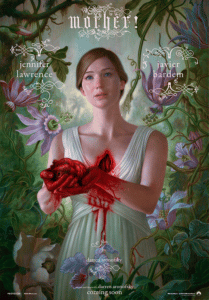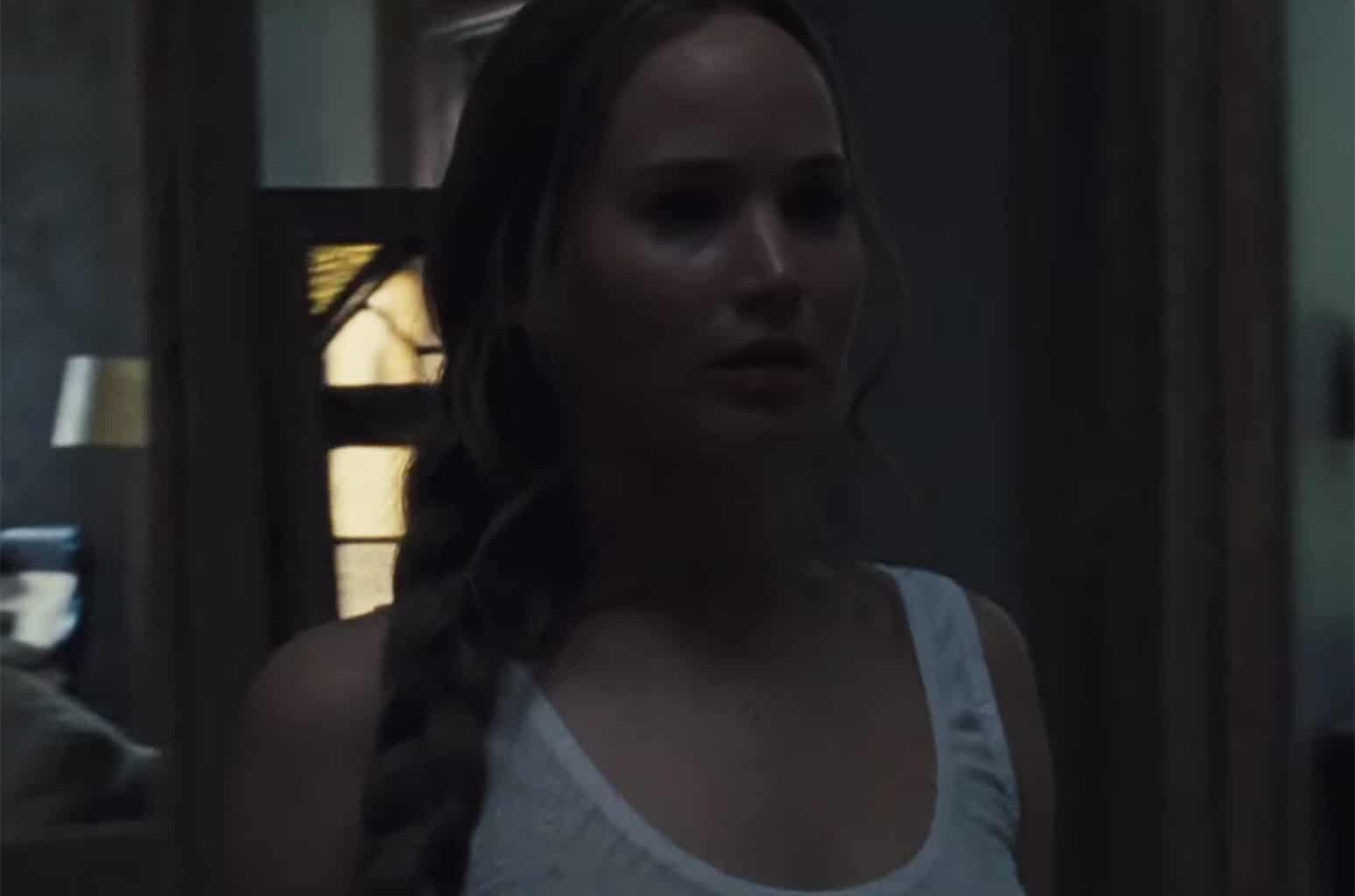If you’ll pardon me starting off in didactic mode, there is a clear distinction between a film review and film analysis. A review, as I understand it (and I should bloody well hope I do, given I’ve written hundreds of the things over the past eight years or so), should give a reasonably succinct overview of the work, establishing a general sense of its tone and content and at least a little insight into its themes, but leaving enough unspoken so that the reader may still find plenty of surprises to enjoy when they sit down to watch it for themselves. Film analysis, by contrast, pretty much hinges on divulging all the secrets, going over all the key plot points, breaking down any apparent symbolism, and presenting a well thought-out hypothesis on exactly what the film is saying based on all of this. Given that I chose to start out on this note, you may have already surmised that mother! is a film that is absolutely screaming to be analysed. There are so many questions to be asked, so many possible conclusions to be drawn – and almost none of this can be done without giving away more or less everything. It isn’t so much that writer-director Darren Aronofsky’s latest defies simple explanation, rather that to explain it simply would be to ruin things for the uninitiated; and even if I were to present such an explanation, there’s not a doubt in my mind that most if not all viewers will come out with an altogether different interpretation than myself.
Yes, it’s fair to say that mother! is challenging viewing, almost certain to intrigue, bamboozle, frustrate, overwhelm, and quite likely appal. However, there can of course be great reward in all that.
 Jennifer Lawrence is the unnamed wife of Javier Bardem’s unnamed older man, a poet struggling to produce his latest work. The two live alone, childless and neighbourless, in his childhood home, a remote, idyllic country house in the middle of a forest; and while he has sought inspiration to no avail, she has rebuilt the house from the ground up, following a fire sometime in the past. It may be a quiet, even lonely life, but she seems content just to be with her husband; but then the equilibrium is broken with the unexpected arrival of a stranger (Ed Harris). The husband warms to this enigmatic visitor, even inviting him to stay in their home; the wife, though clearly taken aback, does not object. The next thing she knows, the stranger’s wife (Michelle Pfeiffer) has shown up, and is also accepted into the house without question. While the wife is clearly unhappy, the husband enjoys having the guests around, feeling that it may give him the inspiration he has been in need of. She begrudgingly accepts this, because she loves him – and really, who can blame her, Javier Bardem is pretty damn lovable. But of course, yet more strangers arrive soon enough, and tensions soon reach boiling point. Still, this surge of activity in their usually quiet space does seem to have the desired effect for her husband’s creativity – but these new creative acts lead to developments which make what came before look like a walk in the proverbial park.
Jennifer Lawrence is the unnamed wife of Javier Bardem’s unnamed older man, a poet struggling to produce his latest work. The two live alone, childless and neighbourless, in his childhood home, a remote, idyllic country house in the middle of a forest; and while he has sought inspiration to no avail, she has rebuilt the house from the ground up, following a fire sometime in the past. It may be a quiet, even lonely life, but she seems content just to be with her husband; but then the equilibrium is broken with the unexpected arrival of a stranger (Ed Harris). The husband warms to this enigmatic visitor, even inviting him to stay in their home; the wife, though clearly taken aback, does not object. The next thing she knows, the stranger’s wife (Michelle Pfeiffer) has shown up, and is also accepted into the house without question. While the wife is clearly unhappy, the husband enjoys having the guests around, feeling that it may give him the inspiration he has been in need of. She begrudgingly accepts this, because she loves him – and really, who can blame her, Javier Bardem is pretty damn lovable. But of course, yet more strangers arrive soon enough, and tensions soon reach boiling point. Still, this surge of activity in their usually quiet space does seem to have the desired effect for her husband’s creativity – but these new creative acts lead to developments which make what came before look like a walk in the proverbial park.
This is the seventh feature Aronofsky has directed in his to-date nineteen year career, and it’s little surprise that it’s a bizarre head-fucker of a movie given that bizarre head-fuckery has largely been his stock-in-trade, ever since the writer-director announced himself with 1998’s low budget math/Kabbalah/paranoia-driven psychological thriller Pi; the fact that someone as averse to mathematics as myself was captivated speaks volumes. His second, 2000’s Requiem for a Dream, ranks among the most unsettling cinematic experiences of my life, to such an extent that I’ve never seen it a second time. 2006’s The Fountain was an epic head-scratcher, hopping timelines, interlacing the scientific and the spiritual and alienating all the regular folk who just came to see Wolverine. And even 2008’s The Wrestler, ostensibly his most grounded and accessible work, challenged viewers with a conclusion that left much unanswered, whilst ultimately telling us all we needed to know.
Of course, the key Aronofsky film that mother! invites comparison with is 2010’s Black Swan. Much like that surreal ballet psychodrama which landed Natalie Portman a well-deserved Oscar, mother! plays out almost exclusively from the perspective of its young female lead, presents a world which initially seems more or less in line with our own, then bit by bit pulls the rug out from under us with increasingly surreal, nightmarish elements that throw everything we’re seeing into question. However, where Black Swan’s dark and weird goings-on were primarily a reflection of the protagonist’s deteriorating mental state, the weirdness of mother! is not quite so easy to wrap up as all that – but in both instances, it serves to say something about how the world treats women, and how women may react to the pressures put upon them.
(Brief interlude: Aronofsky completists will note that I haven’t said anything about his sixth film, Noah… because I haven’t seen it. Sorry. As you were.)
 Now, if you’re thinking to yourself, “what the hell, Ben? You’ve spent the last two paragraphs rabbiting on about Aronofky’s old films just to avoid telling us anything about the new one”… well, then, you’re pretty much correct there. I’m reluctant to go into much more detail on mother! for fear of giving too much away. I’m also aware that it can be a bit reductive to discuss a filmmaker’s latest work purely with regard to how it relates to their existing filmography. That having been said… if you take the feminist leanings of Black Swan, the overwhelming intensity and bleakness of Requiem for a Dream, and the religious overtones of more-or-less everything Aronofsky’s ever done, you may get some sense of what mother! is all about. You might also want to slap a massive dollop of jet-black humour on top as well.
Now, if you’re thinking to yourself, “what the hell, Ben? You’ve spent the last two paragraphs rabbiting on about Aronofky’s old films just to avoid telling us anything about the new one”… well, then, you’re pretty much correct there. I’m reluctant to go into much more detail on mother! for fear of giving too much away. I’m also aware that it can be a bit reductive to discuss a filmmaker’s latest work purely with regard to how it relates to their existing filmography. That having been said… if you take the feminist leanings of Black Swan, the overwhelming intensity and bleakness of Requiem for a Dream, and the religious overtones of more-or-less everything Aronofsky’s ever done, you may get some sense of what mother! is all about. You might also want to slap a massive dollop of jet-black humour on top as well.
Plus we can hardly fail to note that the focal point of mother! for just about the entirety of its two hour running time is Jennifer Lawrence, and as such, one’s enjoyment of mother! may hinge on how they feel about the actress. It bears mentioning, though, that the film does in some respects play on Lawrence’s public persona, with many moments that feel like a sly commentary on her outspoken feminism and the fall-out from her photo hack scandal. Above and beyond all this, though, it’s almost impossible not to read her treatment in mother! as a lament on the treatment of woman overall: she is depended on, expected to behave in particular ways and perform particular tasks (one of which may be self-evident from the title); she is lusted after and propositioned, despised and reviled, taken advantage of and abused, and all the while her own feelings are never taken into consideration. Lawrence has a lot to convey, typically with the camera very close to her face (in a recent interview Aronofsky estimated half the film is in close-up on her), and with fairly minimal dialogue along the way. All things considered it’s tremendous work, and a whole different flavour of descent into madness than Portman’s turn in Black Swan.
Obviously not everyone who sees mother! is going to like it, but it’s even more obvious that this is entirely intentional. It’s surprising and encouraging to see a major studio like Paramount backing something as patently non-mainstream friendly as this and putting serious marketing money behind it, and this combined with the star power of Lawrence and the also-brilliant Bardem pretty much guarantees that mother! will be seen and discussed by people who would generally never go see something as utterly unhinged as this. Still, even those with a vested interest in unconventional cinema are likely to find mother! a most agreeably strange, thought-provoking and often deeply uncomfortable viewing experience.
mother! is in cinemas now.
